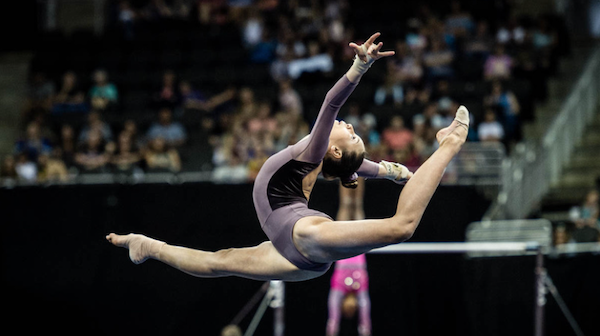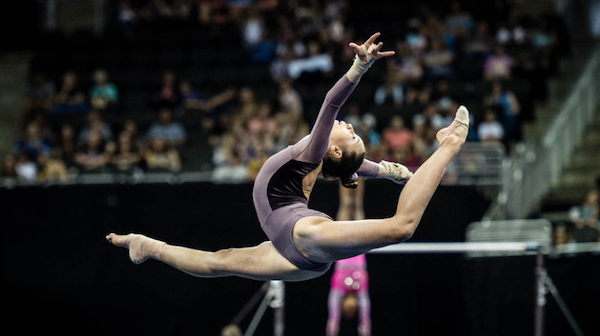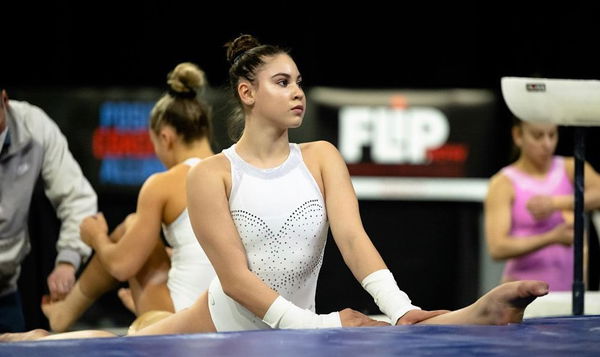



With a record of AA; 40th, UB; 64th, BB; 54th, FX in the 2024 Paris Olympics, this 19-year-old gymnast joined Stanford for the 2024-25 season, looking to showcase her skills at the very top stages and conferences of collegiate gymnastics. When the season came to an end, she made a post on her Instagram with pictures from her freshman year at the college, but none with her on the gymnastics apparatus. Why? She captioned, “That’s a wrap on Freshman Year…Didn’t always go according to plan, but grateful for every step and for all the people I met 🫶“. What went wrong? This gymnast had to redshirt her debut season for Stanford because she struggled with an eating disorder. The announcement came in January 2025. 5 months later, she’s back, and how!
Watch What’s Trending Now!
Inside Gymnastics Magazine took to their official Instagram handle to post updates about Levi Jung-Ruivivar on June 17. Posting a picture of her making a heart with her fingers, they wrote over it, “Anyone who has received treatment for an eating disorder has heard the saying, ‘recovery isn’t linear,’ and I couldn’t agree more. Despite this, everything has been going really well…”. In the caption, they wished her success on her road to recovery and expressed eagerness to see her back on the floor. But those were just the extracts from her post 18 weeks ago.
The gymnastics star, in return to the magazine, dropped a “❤️” in the comment section, and she also took the post to her story where she wrote, “Thank you @insidegym“. But this wasn’t the only important thing in the story. Providing a further update on her condition, she wrote in the story, “things are going really well…getting back into gym ❤️❤️❤️” To address the question of whether she could be seen back on the competition: in her post where she talked of redshirting this season Levi also said that “I will return to school and training before the spring quarter starts.”
Levi Jung‑Ruivivar (b. May 3, 2006, Los Angeles) is a Filipino‑American artistic gymnast who began training at just 18 months and climbed to U.S. senior elite level through clubs like WOGA—earning standout results including a 2022 Winter Cup uneven bars title, team gold at DTB Pokal, and finals appearances at World Challenge Cups. In 2023, she officially switched allegiance to the Philippines and, in early 2024, clinched a silver on uneven bars in Doha, securing her Olympic berth with 62 FIG World Cup points. At the 2024 Asian Championships, she earned bronze on bars and placed sixth all-around, after this was Paris and Stanford.

Levi, becoming a victim of an eating disorder, speaks of a very underlying yet critical problem with gymnastics, which is the eating disorder itself. She is not the first victim of it, and she will not be the last, not even for the whole year.
Levi Jung-Ruivivar isn’t the only one…
Emma Spence created quite a stir when she won a silver medal in the 2024 Pan American Championships team event. In her 2025 season at Nebraska, she earned First-Team All‑Big Ten honors for the third straight year, won the uneven bars title at the Big Ten Championships with a career-high 9.975, and secured 12 individual event victories throughout the year. But it also wasn’t always gold for her. Talking to The Record earlier this season, the Canadian gymnast unveiled a certain horror element from her elite career.
She said, “The external pressures from my training environments got to me and became very harmful. My eating disorder controlled me, and I didn’t care about my health and well-being anymore. I was sacrificing my mental and physical health to become the version of myself that others wanted me to be.” She wanted to become the person she wasn’t, and due to that, her mental state deteriorated.
Maggie Nichols built a stellar NCAA career at the University of Oklahoma, where she became an eight-time NCAA champion, completed the prestigious Gym Slam twice, and helped lead the Sooners to two national titles. But it wasn’t all gold for her either. Early in her career, her coach Marta Karolyi saw her tall, muscular build as a problem, not an asset, and demanded she lose weight. At the same time, Nichols, like many of her other teammates, was being abused by team doctor Larry Nassar. The collective trauma led her to develop an eating disorder.
In her memoir, UNSTOPPABLE, she recalled an incident where she was taken in front of a mirror by Karolyi and was told, “You’re puffy. You look puffy. Like a marshmallow.” In an interview with People Magazine, she confessed, “I was never diagnosed with an eating disorder or body dysmorphia, but I definitely think I had both for a very long time. At first, it felt imposed on me by others, but then my own drive to be perfect made it worse.” These are only two examples of two gymnasts suffering from eating disorders; there are many others out there, and it’s worrying, don’t you think?

